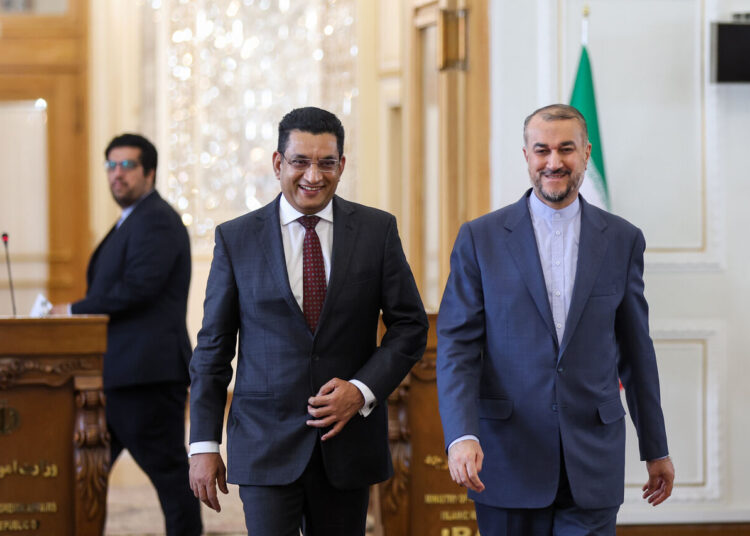Convening in Tehran on Saturday, the foreign ministers of Iran and Sri Lanka assembled for a meeting of minds. The Iranian minister, Hossein Amirabdollahian, illuminated their discourse in the aftermath: The dialogue saw deliberations regarding the forthcoming liberation of Iranian and Sri Lankan detainees, mutually agreed upon to be carried out imminently with an indelible touch of humanity.
Amirabdollahian further suggested that the conversation accentuated the need to bolster consular relations, to catalyze the joint economic commission, and to invigorate the consular committee linking the two countries. Among the subjects broached, he disclosed, were measures against “drug trafficking and human trafficking”. Emerging from the gathering, the minister stressed their shared focus on augmenting economic and commercial collaboration, firmly ensconced within the bounds of international law.
Representing Sri Lanka, foreign minister Ali Sabry marked this occasion as his inaugural journey to Iran, expressing regret for not having made the voyage sooner. He encouraged Iranian nationals to explore Sri Lanka’s vibrancy, envisaging their journey as an “auspicious commencement towards greater bilateral prosperity”. In observing “Sri Lanka’s geographic vantage point and potential commerce openings”, Sabry urged Iranian enterprises to reconnoiter “the opportunities presented by Sri Lanka—an effective portal to South and East Asia”.
Ali Sabry further elucidated Sri Lanka’s diplomatic mantra to be “a friend to all and an adversary to none”. He extended a warm hand of friendship towards Iran, both regionally and internationally, and communicated his desire to perpetuate this amity.
The spotlight was then trained on the trade of Sri Lankan tea exports to Iran. The Iranian Foreign Minister referenced the ubiquity of Ceylon tea in every Iranian household and expounded upon Sri Lanka’s enhanced capacities in tea production and export. The discussions broached also encompassed Iran’s versatile items for import.
Earlier in the year, a Reuters report quoted Niraj de Mel, Sri Lanka’s Tea Board Chairman, forecasting the initiation of a tea-oil barter with Iran, to offset a $250 million oil debt. This arrangement, achieved in 2021, had been deferred due to an unprecedented dollar crash that ensnared Sri Lanka’s economy in its gravest financial crisis in over seven decades. The debt correlates to Iran’s past oil exports to a Sri Lankan state enterprise nearly a decade ago.
Amirabdollahian also referenced the involvement of Iranian enterprises in Sri Lankan projects. He underlined “the opportunities that have emerged through this active participation”, drawing attention to potential undertakings such as an “oil refinery and power plant installation”.
A report circulated mid-June signified Iran’s ambition to establish a 120MW power plant in Sri Lanka, revealing that these plans were in their advanced stages. Prospects for new initiatives led by Iranian firms operating in the energy and water sectors were also noted.
In Amirabdollahian’s account of their dialogue, the ministers appraised the most recent state of previously ratified agreements. The potential for nurturing future accords between the nations was also contemplated, with both parties concurring on the necessity to enforce the standing agreements.
In view of Sri Lanka’s impending presidency of the Indian Ocean Rim Association (IORA), Amirabdollahian discussed the potential to augment cooperation within this strategic oceanic region. He perceived Sri Lanka’s IORA presidency as “an opportunity to foster stronger associations between Asia and other member nations of IORA”. Similarly, Sri Lanka’s foreign minister perceived the impending IORA presidency as a platform to “promote multilateralism in a global context, envisioning Iran as a potential influential player”.






